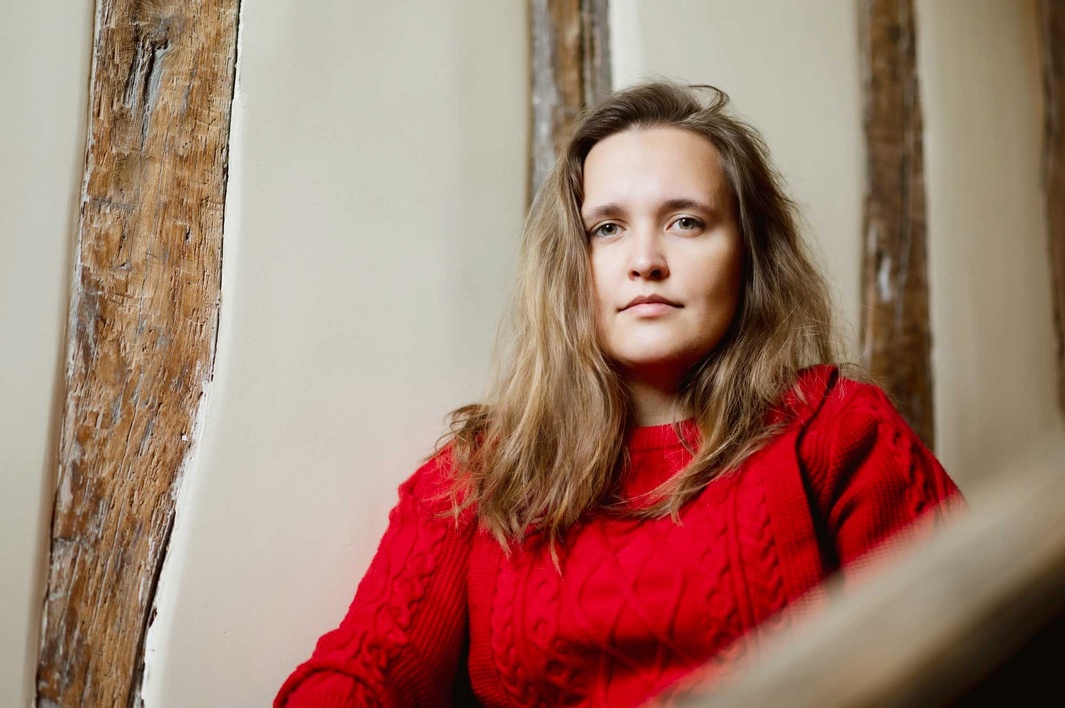Lorsque, au début de l’été 2024, Clara Olivares s’engage dans une résidence en recherche artistique à l’Ircam, la compositrice sort d’une période intense consacrée à la conception de son opéra Les Sentinelles, sur un livret de Chloé Lechat (en création du 10 au 13 avril prochain à l’Opéra-Comique). Un travail tout indiqué, en vue d’un chantier sur la voix. Le projet proposé par Clara Olivares porte en effet sur ISiS (pour « Ircam’s Singing Synthesizer »), un logiciel de synthèse vocale développé par l’équipe Analyse et synthèse des sons.
L’intérêt de Clara Olivares pour la voix ne transparait certes pas de ses précédents travaux à l’Ircam. En 2020-21, alors étudiante au Cursus, elle s’intéresse à la fabrication de percussions en verre, de la conception au soufflage, et jusqu’à l’exploitation de leur résonance via un transducteur collé sur la peau d’une timbale. En 2022, en réponse à une commande de l’Ircam et de l’Ensemble intercontemporain, elle s’est frottée au Concerto pour cor, ensemble et électronique.
La voix a pourtant été son « instrument de prédilection » à ses débuts. Pour intégrer la classe de composition de Mark Andre au Conservatoire de Strasbourg, elle écrit une miniature pour 16 voix ; une petite pièce que le professeur l’encourage à soumettre à la cheffe de chœur du conservatoire. Cette dernière lui en demande alors une autre, et une autre encore – requête qui devient bientôt une commande en bonne et due forme. De fil en aiguille, l’aisance et le naturel de son écriture vocale attirent l’attention de ses condisciples chanteurs et chanteuses, pour lesquel.le.s elle compose des pièces d’examen. Ce « bain vocal » aboutit à l’écriture d’un premier opéra de chambre, Mary, en 2016-2017, pour la fin de son Master 2.

Clara Olivares © Amandine Lauriol
« Au cours de ces années d’étude, mon approche de la voix était plutôt intuitive, analyse Clara Olivares. Composer pour mes condisciples m’amenait naturellement à mettre en valeur leurs qualités respectives, sans nécessairement me pousser hors de ma zone de confort pour interroger l’instrument, et encore moins pour le bousculer. Lorsque je suis partie à l’Université de Californie Berkeley pour mon doctorat, j’ai voulu prendre mes distances avec la voix, pour m’attacher à l’écriture instrumentale et orchestrale. »
L’ascèse vocale à laquelle elle s’astreint au cours de cette période américaine lui permet d’y revenir avec une plus grande fraîcheur et liberté. Sa fréquentation assidue de l’instrumental l’amène même à ne voir en la voix qu’un instrument comme les autres, dont on peut à l’envi forcer la nature. Ce qu’elle fait notamment dans l’écriture des Sentinelles : dans cet opéra composé pour un trio de deux chanteuses et une comédienne, elle explore toutes les formes vocales, du théâtre au chant, en passant par le Sprechgesang – qui figure comme un lieu d’expression commun à toutes les protagonistes. C’est donc forte de cette expérience qu’elle se lance dans sa résidence en recherche artistique consacrée au logiciel de synthèse ISiS.
Pourquoi donc ce logiciel en particulier ? « Chaque logiciel a ses missions et ses processus, constate Clara Olivares. En l’occurrence, la logique de fonctionnement d’ISiS correspond assez bien à ma pensée musicale, par accumulations de couches et de calques. S’appuyant sur une faramineuse banque d’échantillons vocaux, il en explore les possibilités d’associations pour générer des mélodies. » ISiS n’est toutefois pas encore totalement abouti – une motivation supplémentaire pour la compositrice :
« Travailler sur un logiciel en cours de développement permet d’en être partie prenante. D’habitude, au cours d’une production, on peut suggérer la mise au point d’un plug-in, pour concrétiser une idée artistique en particulier, mais on n’est pas au cœur de l’action. On n’a pas non plus le temps de s’y consacrer véritablement. Dans le cadre de cette résidence, je vais pouvoir engager un dialogue fertile avec les scientifiques qui y travaillent. »
Reste à savoir dans quelles directions elle aimerait aller. « Il est encore un peu tôt pour le dire. Ce qui est certain, c’est que l’écriture opératique a nourri mes réflexions. Une première étape sera donc d’explorer les possibilités du logiciel, notamment sa capacité à imiter au plus près la voix humaine, et surtout les divers paramètres d’expressivité vocale. De là, une première idée serait d’utiliser ISiS comme outil d’aide à la composition : pour lui faire chanter mes propres morceaux, éprouver mes esquisses avec différents styles de voix. Une autre idée serait d’améliorer et d’affiner encore les processus afin que le rendu sonore soit suffisamment satisfaisant pour être exploité en concert. »
Dans un deuxième temps, la compositrice imagine se servir du logiciel dans ses modes limites, voire même hors de sa destination première.
« ISiS est pensé pour imiter la voix humaine, en reproduire le naturel, les inflexions, les nuances, le grain, la précision des attaques… Comment à partir de là, inventer du non-humain ? Imiter l’existant, c’est très bien, mais flirter avec les limites, explorer ce pourquoi l’outil n’a pas été conçu permet de démultiplier les possibilités de jeu et d’écriture, voire de réveiller de l’impensé. À cet égard, explorer les possibilités ISiS pour générer de la voix non chantée sera certainement très intéressant aussi, de même que du cri ou du souffle, pour lequel le logiciel n’a pas non plus été conçu. »
Dernière piste de travail : l’interface. Pour l’instant, manipuler ISiS exige, soit de passer par un module dans l’environnement Max, soit de rédiger des lignes de commandes dans une console (c’est une « Command-Line Application »).
« L’équipe d’ISiS est d’ores et déjà en train de travailler sur une interface graphique simple, afin de rendre son utilisation plus fluide, intuitive et facilement appréhendable, sans frein technique pour un compositeur qui ne serait pas lui-même codeur. Un travail auquel je contribue naturellement, à commencer par mes retours d’expérience » conclut Clara Olivares.
![]()
Propos recueillis par Jérémie Szpirglas


